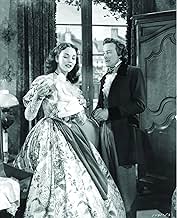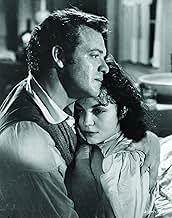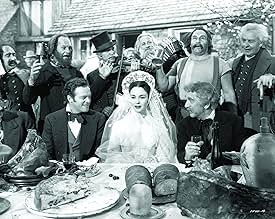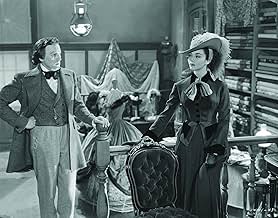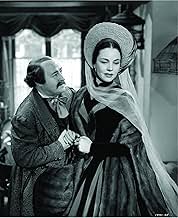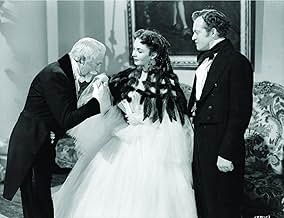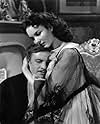NOTE IMDb
7,0/10
3,1 k
MA NOTE
Les illusions romantiques de la femme d'un médecin de province sur la vie et le statut social la conduisent à trahir son mari naïf, à se faire des amants et à accumuler des dettes ruineuses.Les illusions romantiques de la femme d'un médecin de province sur la vie et le statut social la conduisent à trahir son mari naïf, à se faire des amants et à accumuler des dettes ruineuses.Les illusions romantiques de la femme d'un médecin de province sur la vie et le statut social la conduisent à trahir son mari naïf, à se faire des amants et à accumuler des dettes ruineuses.
- Réalisation
- Scénario
- Casting principal
- Nommé pour 1 Oscar
- 2 victoires et 1 nomination au total
Alf Kjellin
- Leon Dupuis
- (as Christopher Kent)
Harry Morgan
- Hyppolite
- (as Henry Morgan)
Avis à la une
Jennifer Jones is "Madame Bovary" in this 1949 adaptation of Flaubert's novel, directed by Vincente Minnelli and also starring Van Heflin, James Mason, Louis Jourdan, Gene Lockhart, Alf Kjellin and Ellen Corby. The film starts with Flaubert, on trial for indecency. As he defends the book, he tells the story of Emma Bovary, a delusional young woman living on a farm who, from romantic novels, has unrealistic ideas about love and happiness. She nabs a simple country doctor (Van Heflin) and proceeds to buy herself an incredible wardrobe and live as a rich woman, even though she and her husband are not wealthy. She has a little girl whom she ignores, leaving her to the nurse (Corby). Emma soon becomes bored and attempts to seduce a young man (Kjellin), but his mother (Gladys Cooper) catches on and sends him to Paris. Then she meets Boulanger (Jourdan) at a party, becomes his lover and plans to run away with him to Italy - but he sees what high maintenance she is and takes off without her. In an attempt to make her husband more prominent, she attempts to talk him into performing a new surgery, but he refuses (in the book, however, he's ambitious as well and does the surgery, which is a failure). Meanwhile, unbeknownst to her husband, she owes a fortune, and if she doesn't find a way out, the family is due to lose their home and furnishings.
"Madame Bovary" is one of the most stunning films ever made, with a captivating performance by Jones who makes Emma pathetic, desperate, frantic and sympathetic. As one of the comments on the board pointed out, it's easy to make Emma unlikable. With Jones' natural charm making her likable and somewhat sweet, we can see ourselves in Emma. She has great backup from Heflin as her cowed husband. Jourdan is handsome and arrogant - he sees his future with Emma, and he doesn't like it.
Minnelli handles every detail beautifully in this film. Not enough can be said about the waltz at the party, its dizzying effects making it one of the most thrilling scenes on film. When Emma later puts on the same gown and looks in the mirror and remembers that night, we know for her it was the ultimate dream evening, when she become one with the heroines of the novels she read. The gowns - well, there have been beautiful gowns in films - the 1938 Marie Antoinette comes to mind - and, as in that film, these gowns are works of art, particularly the white ball gown. When Boulanger returns from Italy, and Emma goes to see him, she actually looks different - tired and older - the subtlety of the makeup is spectacular.
Though set in France in the mid-1800s, Madame Bovary is a classic because it deals with an ordinary person so dazzled by illusion that she cannot accept anything about her life as it exists. How apropos for today, when the media bludgeons us with multimillion dollar homes, heiresses who go to parties every night, size zero, red carpet premieres - it's hard to be happy when you're a housewife in sweats paying $4 a gallon for gas. Even before films, television, the tabloids and the Internet, people weren't satisfied with their lives because they were told to compare their inside with someone else's outside and found themselves not measuring up.
"Madame Bovary" isn't an immorality tale, it's a morality tale and, of course, Flaubert was acquitted. It's considered one of the two greatest novels ever written, along with Anna Karenina, and it's perfectly adapted for film in the 1949 version - the story of a woman who thinks that shopping on credit till she drops is the way to real happiness. Like many in the 20th and 21st centuries have found, she was wrong.
"Madame Bovary" is one of the most stunning films ever made, with a captivating performance by Jones who makes Emma pathetic, desperate, frantic and sympathetic. As one of the comments on the board pointed out, it's easy to make Emma unlikable. With Jones' natural charm making her likable and somewhat sweet, we can see ourselves in Emma. She has great backup from Heflin as her cowed husband. Jourdan is handsome and arrogant - he sees his future with Emma, and he doesn't like it.
Minnelli handles every detail beautifully in this film. Not enough can be said about the waltz at the party, its dizzying effects making it one of the most thrilling scenes on film. When Emma later puts on the same gown and looks in the mirror and remembers that night, we know for her it was the ultimate dream evening, when she become one with the heroines of the novels she read. The gowns - well, there have been beautiful gowns in films - the 1938 Marie Antoinette comes to mind - and, as in that film, these gowns are works of art, particularly the white ball gown. When Boulanger returns from Italy, and Emma goes to see him, she actually looks different - tired and older - the subtlety of the makeup is spectacular.
Though set in France in the mid-1800s, Madame Bovary is a classic because it deals with an ordinary person so dazzled by illusion that she cannot accept anything about her life as it exists. How apropos for today, when the media bludgeons us with multimillion dollar homes, heiresses who go to parties every night, size zero, red carpet premieres - it's hard to be happy when you're a housewife in sweats paying $4 a gallon for gas. Even before films, television, the tabloids and the Internet, people weren't satisfied with their lives because they were told to compare their inside with someone else's outside and found themselves not measuring up.
"Madame Bovary" isn't an immorality tale, it's a morality tale and, of course, Flaubert was acquitted. It's considered one of the two greatest novels ever written, along with Anna Karenina, and it's perfectly adapted for film in the 1949 version - the story of a woman who thinks that shopping on credit till she drops is the way to real happiness. Like many in the 20th and 21st centuries have found, she was wrong.
Although it is several years since I saw it I can remember the beautiful photography and period setting of this not very happy story of a tormented woman.Particularly Jennifer Jones,a vastly underrated actress giving a sensitive performance which one imagined could have done with a bit more directoral guidance. Minnelli was one of those directors who seemed to give all or nothing to his projects.By his own admission he had very little interest in "Kismet" as he wanted to get it out of the way in order to start "Lust for Life" with Kirk Douglas.The lumbering manner of "Kismet" shows this to be true !! (he owed MGM one picture under his contract before starting "Lust for Life" and unfortunately for the project "Kismet" was it)Additionally Minelli did not want Jones in the lead role and one wonders how influencial David Selznick was in pushing for Jennifer once Lana Turner was unavailable for the lead.At any rate Lana had not yet developed her dramatic abilities which would lie some years ahead.Jennifer showed that she was adaptable to many moods including a few years later her scene stealing turn in "Beat the Devil" few actresses can take credit for stealing a picture away from Bogie,Peter Lorre,Robert Morley and LaLolla. Back to Madame Bovary,although the subject is a heavy one,it is well handled by Minnelli,and most reference books today regard it as a sadly neglected piece,which deserves a wider recognition.Interestingly if my memory serves me correctly Vincente barely mentions it in his autobiography.Maybe his private life at the time and his more financially successful works figure more prominantly in his memory.If I had directed Madame Bovary I would be immensly proud of it.Maybe he was.
Madame Bovary is directed by Vincente Minnelli and adapted to screenplay by Robert Ardrey from the Gustave Flaubert novel. It stars Jennifer Jones, Van Heflin, Louis Jourdan, Alf Kjellin, Gene Lockhart and James Mason. Music is by Miklós Rózsa and cinematography by Robert H. Planck.
It's most interesting now watching Minnelli's picture and being able to place it in the time it was made. Also of major interest is reading up on what the critics of the time had to say about it. This version is an undoubted lesson in the technical crafts of film making, the visuals, the sound, art design, costuming and a literary pumped screenplay that allows the cast to play it classical. It's also black hearted, perfectly in keeping with the gathering storm of the era that was film noir.
Here is the monster.
Some of the complaints about the film, to me anyway, just don't add up. Why do we need to care about anyone in this story? It's a dark tale of illicit passions, greed, betrayals, bad parenting and etc. Is this frowned upon in some circles because of love for the classic novel? Or because there's some esteem held for other versions? The criticism of Jones is also very suspect given it's a classic femme fatale performance, Emma is cold and driven and shallow to others feelings, Jones works it perfectly.
As Rózsa's beautiful lush and poignant musical arrangements drift and hover over the various story instalments, Minnelli brings the film making guile. His camera work is sublime, like a ghost moving about the characters for the more vibrant scenes, tracking and roving, dizzyingly beautiful. At others it's close and personal, imbuing Emma's claustrophobia, with the black and white contrasts superbly photographed by Planck.
So it doesn't capture the essence of Flaubert's intent, then? Emma Bovary a figure of hate instead of sympathy, the lack of a caustic aside on a society of double standards? So what! Outstanding film making is just that, especially when it can tune into a style of film making prevalent at its birth. Madame Bovary - maybe the most film noir movie not actually considered a film noir. Brilliant. 9/10
It's most interesting now watching Minnelli's picture and being able to place it in the time it was made. Also of major interest is reading up on what the critics of the time had to say about it. This version is an undoubted lesson in the technical crafts of film making, the visuals, the sound, art design, costuming and a literary pumped screenplay that allows the cast to play it classical. It's also black hearted, perfectly in keeping with the gathering storm of the era that was film noir.
Here is the monster.
Some of the complaints about the film, to me anyway, just don't add up. Why do we need to care about anyone in this story? It's a dark tale of illicit passions, greed, betrayals, bad parenting and etc. Is this frowned upon in some circles because of love for the classic novel? Or because there's some esteem held for other versions? The criticism of Jones is also very suspect given it's a classic femme fatale performance, Emma is cold and driven and shallow to others feelings, Jones works it perfectly.
As Rózsa's beautiful lush and poignant musical arrangements drift and hover over the various story instalments, Minnelli brings the film making guile. His camera work is sublime, like a ghost moving about the characters for the more vibrant scenes, tracking and roving, dizzyingly beautiful. At others it's close and personal, imbuing Emma's claustrophobia, with the black and white contrasts superbly photographed by Planck.
So it doesn't capture the essence of Flaubert's intent, then? Emma Bovary a figure of hate instead of sympathy, the lack of a caustic aside on a society of double standards? So what! Outstanding film making is just that, especially when it can tune into a style of film making prevalent at its birth. Madame Bovary - maybe the most film noir movie not actually considered a film noir. Brilliant. 9/10
Jennifer Jones was a star I knew well from visits to the cinema with my family during the 1950's: "The Man in the Grey Flannel Suit", "The Barretts of Whimpole Street", "Love is a Many Splendored Thing" and "A Farewell to Arms".
I cut in on her at a certain stage in her career. She was a bit older than my mum, and although I liked her she didn't have the effect on a prepubescent lad that Yvette Mimieux or Tuesday Weld were having.
It wasn't until later, when we got television, that I saw the movies she made earlier in her career; "Song of Bernadette, "Duel in the Sun", "Portrait of Jennie", "Carrie" and this one: Vincente Minnelli's "Madame Bovary". What an absolute stunner she was.
Emma Bovary (Jennifer Jones) is the beautiful daughter of a poor French family, but she has an overactive imagination fostered by romantic novels.
She marries a country doctor Charles Bovary (Van Heflin) who she doesn't really love hoping to advance her standing in society and pursue her romantic dreams. However she soon outspends her husband's capacity to earn. In an era before credit cards, she maxes-out on credit notes.
Emma attracts men like moths to a flame, and cheats on her husband who still loves her despite everything. There are tears before the final fade out.
The film is bookended with the trial of Gustave Flaubert who wrote the original novel. Apparently the story so outraged the French hierarchy that they took old Gustave to court. He got off and of course the book became a bestseller.
The filmmakers used the trial to allow Gustave (James Mason) to narrate the story - quoting passages of Flaubert's prose. Although narration can be a lazy device in film, in this case, Mason's mellifluous voice puts us in the picture quickly. More importantly, Emma is seen sympathetically despite being hopelessly self-focused.
Two actors added the final touch of class to the 1949 version. Van Heflin is such a nice guy here that we are waiting for someone to smack Emma to her senses. Louis Jordan gives another variation on that smooth roué he played in "Letter to an Unknown Woman" - a not dissimilar drama.
Composer Miklos Rozsa surpassed himself with the score. With its beautiful main theme for Emma and flowing melodies it sweeps you along.
A 2014 version did away with narration. It's more low-key, but quite good with a totally different vibe to the Minnelli version. It was filmed in France and is more explicit with a fair bit of nudity. Jennifer Jones was fortunate that her movie career was in an era where she didn't have to worry about getting in shape for that kind of thing.
I cut in on her at a certain stage in her career. She was a bit older than my mum, and although I liked her she didn't have the effect on a prepubescent lad that Yvette Mimieux or Tuesday Weld were having.
It wasn't until later, when we got television, that I saw the movies she made earlier in her career; "Song of Bernadette, "Duel in the Sun", "Portrait of Jennie", "Carrie" and this one: Vincente Minnelli's "Madame Bovary". What an absolute stunner she was.
Emma Bovary (Jennifer Jones) is the beautiful daughter of a poor French family, but she has an overactive imagination fostered by romantic novels.
She marries a country doctor Charles Bovary (Van Heflin) who she doesn't really love hoping to advance her standing in society and pursue her romantic dreams. However she soon outspends her husband's capacity to earn. In an era before credit cards, she maxes-out on credit notes.
Emma attracts men like moths to a flame, and cheats on her husband who still loves her despite everything. There are tears before the final fade out.
The film is bookended with the trial of Gustave Flaubert who wrote the original novel. Apparently the story so outraged the French hierarchy that they took old Gustave to court. He got off and of course the book became a bestseller.
The filmmakers used the trial to allow Gustave (James Mason) to narrate the story - quoting passages of Flaubert's prose. Although narration can be a lazy device in film, in this case, Mason's mellifluous voice puts us in the picture quickly. More importantly, Emma is seen sympathetically despite being hopelessly self-focused.
Two actors added the final touch of class to the 1949 version. Van Heflin is such a nice guy here that we are waiting for someone to smack Emma to her senses. Louis Jordan gives another variation on that smooth roué he played in "Letter to an Unknown Woman" - a not dissimilar drama.
Composer Miklos Rozsa surpassed himself with the score. With its beautiful main theme for Emma and flowing melodies it sweeps you along.
A 2014 version did away with narration. It's more low-key, but quite good with a totally different vibe to the Minnelli version. It was filmed in France and is more explicit with a fair bit of nudity. Jennifer Jones was fortunate that her movie career was in an era where she didn't have to worry about getting in shape for that kind of thing.
Film opens at Flaubert's (Mason) 1857 trial for obscenity in France. After the prosecution finishes its' case, Flaubert answers; his answer frames a flashback to Emma Bovary's (Jones) story.
She grows up on an isolated farm, and is further isolated by her convent education. She grows up believing and fantasizing about love and romance, and that they happen in real life as in fiction. When Dr. Bovary (Heflin) comes to treat her fathers' broken leg, she sees him as her Prince Charming and falls in love with him. After the two marry, they go to the village in Normandy where Charles lives. .
Jones is extraordinary as Madame Bovary. She hits all the right notes as a girl who can't/doesn't separate fantasy from reality. She is marvelously subtle as a woman who switches from role to role in her fantasy life, and doesn't let reality intrude until it's too late. She at least deserved a Best Actress nomination from the Academy.
Van Heflin is good if overemphatic and too American as Emma's husband. Louis Jourdan is just about perfect as Emma's seducer who literally sweeps her off her feet. James Mason is fine as Flaubert.
Miklos Rozsa contributed a fine score, with especially notable music for the ball scene. Vincent Minnelli's direction is subtle. This is a very good film for a tearjerker. Jones and Minnelli are at their best.
She grows up on an isolated farm, and is further isolated by her convent education. She grows up believing and fantasizing about love and romance, and that they happen in real life as in fiction. When Dr. Bovary (Heflin) comes to treat her fathers' broken leg, she sees him as her Prince Charming and falls in love with him. After the two marry, they go to the village in Normandy where Charles lives. .
Jones is extraordinary as Madame Bovary. She hits all the right notes as a girl who can't/doesn't separate fantasy from reality. She is marvelously subtle as a woman who switches from role to role in her fantasy life, and doesn't let reality intrude until it's too late. She at least deserved a Best Actress nomination from the Academy.
Van Heflin is good if overemphatic and too American as Emma's husband. Louis Jourdan is just about perfect as Emma's seducer who literally sweeps her off her feet. James Mason is fine as Flaubert.
Miklos Rozsa contributed a fine score, with especially notable music for the ball scene. Vincent Minnelli's direction is subtle. This is a very good film for a tearjerker. Jones and Minnelli are at their best.
Le saviez-vous
- AnecdotesAfter the expensive box-office failure of Le pirate (1948), director Vincente Minnelli worked hard to cut corners on this film, fearing he might be accused of extravagance. However, he devoted a great deal of time to the ball sequence, which he regarded as the most important scene in the film; he even had composer Miklós Rózsa compose the waltz theme used in it well in advance of the start of filming.
- GaffesWhen Madame Bovary asks Leon for money, he reacts by punching out one of the glass window panes. But on the next cut, the previously shattered window pane is now intact.
- Citations
Emma Bovary: Do you know, Charles, why that clock strikes? To announce the death of another hour.
- Versions alternativesAlso shown in a computer colorized version.
- ConnexionsFeatured in Some of the Best: Twenty-Five Years of Motion Picture Leadership (1949)
Meilleurs choix
Connectez-vous pour évaluer et suivre la liste de favoris afin de recevoir des recommandations personnalisées
Everything New on HBO Max in August
Everything New on HBO Max in August
Looking for something different to add to your Watchlist? Take a peek at what movies and TV shows are coming to HBO Max this month.
- How long is Madame Bovary?Alimenté par Alexa
Détails
- Date de sortie
- Pays d’origine
- Site officiel
- Langue
- Aussi connu sous le nom de
- Madame Bovary und ihre Liebhaber
- Lieux de tournage
- Société de production
- Voir plus de crédits d'entreprise sur IMDbPro
- Durée
- 1h 54min(114 min)
- Couleur
- Rapport de forme
- 1.37 : 1
Contribuer à cette page
Suggérer une modification ou ajouter du contenu manquant


